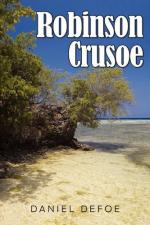|
This section contains 5,582 words (approx. 19 pages at 300 words per page) |

|
SOURCE: "Myth and Fiction in Robinson Crusoe," in God's Plots & Man's Stories: Studies in the Fictional Imagination from Milton to Fielding, The University of Chicago Press, 1985, pp. 187-212.
In the following excerpt, Damrosch considers Robinson Crusoe's "desacralizing" of the world, which in the novel becomes a workplace of men and an equivocal Providence.
Mimesis, Allegory, and the Autonomous Self
In 1719, at the age of fifty-nine, the businessman, pamphleteer, and sometime secret agent Daniel Defoe unexpectedly wrote the first English novel. The affinities of Robinson Crusoe with the Puritan tradition are unmistakable: it draws on the genres of spiritual autobiography and allegory, and Crusoe's religious conversion is presented as the central event. But this primal novel, in the end, stands as a remarkable instance of a work that gets away from its author, and gives expression to attitudes that seem to lie far from his conscious intention. Defoe sets...
|
This section contains 5,582 words (approx. 19 pages at 300 words per page) |

|


